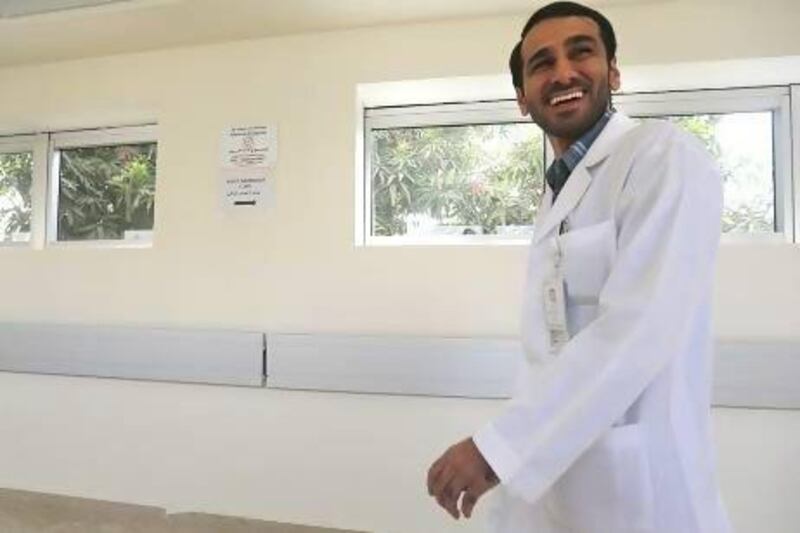ABU DHABI // Many surgeons save lives, but Dr Muqdad Al Hammadi saves limbs as well.
Reattaching body parts, treating horrific burns and performing complicated, multi-hour operations are all in a day's work for Dr Al Hammadi, a plastic surgeon at Mafraq Hospital.
Dr Al Hammadi is one of the country's pioneers in microsurgery, a branch of medicine he likens to "watch-making". Microsurgery involves the use of microscopes and microsets - tiny tools - to reattach body parts or transfer tissue.
"Each operation takes between six and 10 hours, or more. We take soft tissue, bones, or muscle from anywhere in the patient's body and transplant it where there's a defect," he said.
One day he could be sewing a finger back on, another day he could be moving tissue from someone's thigh to fill a hole in their foot. In all cases, precision is essential as the small blood vessels and nerves involved are rarely larger than 1mm in diameter.
"You have to be very slow when you work, and move less than 1mm when you cut into the skin and tissue. Any minimal mistake in the six hours of surgery and you'll lose everything - like the people who make watches."
Dr Al Hammadi began his medical career at United Arab Emirates University in Al Ain, then worked for a year in the UAE before moving to Germany for six years, where he received specialist training.
"When I left for Germany, my dream was to help people here to reattach fingers. But when I worked with their plastic surgery department, my thinking completely changed. I was always helping out the head of the department in theatre. They did really complicated cases and the variety in training there was huge.
"When I came back, nobody was really doing this in Abu Dhabi. Over the past two years, I've personally done about 15 cases."
It is a rare specialisation, but one he is keen for his peers to take up. "Microsurgery has grown at the hospital these past two years: I'm really happy with that. I hope it spreads across the country. A lot of surgeons don't like to do it because it's complicated, time consuming and really stressful.
"After the operation you have to follow the patient hourly for the first 24 hours, then every four hours for a week. And if there's a complication like thrombosis in the artery, you have to repeat some of the operation again. That's happened to me about four times.
One of his patients lost most of his fingers on one hand in a car crash. The hand was so badly damaged, other doctors planned to amputate. But Dr Al Hammadi knew there was a better option.
"If you don't have the experience you may think a severely crushed hand needs to be amputated. That's why I'm trying to teach colleagues and young people not to reach any conclusions right from the start. They have to go to the operating theatre, clean the wounds and take their time."
After three sessions, including two reconstruction operations, Dr Al Hammadi was able to reattach the fingers.
Another patient lost a large amount of tissue from a foot after it became infected; leaving a gaping hole. Dr Al Hammadi's team filled the hole with tissue transplanted from the patient's thigh.
"There's a scar, but it's not very noticeable. That is the art of plastic surgery - you have to think about reconstructive and aesthetic aspects at the same time.
"If they didn't have a surgeon performing such an operation they'd have ended up having it amputated. You save limbs and you save lives with such operations."






